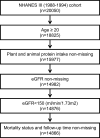The Associations of Plant Protein Intake With All-Cause Mortality in CKD
- PMID: 26687923
- PMCID: PMC4769135
- DOI: 10.1053/j.ajkd.2015.10.018
The Associations of Plant Protein Intake With All-Cause Mortality in CKD
Abstract
Background: Plant protein intake is associated with lower production of uremic toxins and lower serum phosphorus levels. Therefore, at a given total protein intake, a higher proportion of dietary protein from plant sources might be associated with lower mortality in chronic kidney disease.
Study design: Observational study.
Settings & participants: 14,866 NHANES III participants 20 years or older without missing data for plant and animal protein intake and mortality.
Predictors: Plant protein to total protein ratio and total plant protein intake. Patients were stratified by estimated glomerular filtration rate (eGFR)<60 or ≥60mL/min/1.73m(2).
Outcomes: All-cause mortality.
Measurements: Plant and total protein intakes were estimated from 24-hour dietary recalls. Mortality was ascertained by probabilistic linkage with National Death Index records through December 31, 2000.
Results: Mean values for plant protein intake and plant protein to total protein ratio were 24.6±13.2 (SD) g/d and 33.0% ± 14.0%, respectively. The prevalence of eGFRs<60mL/min/1.73m(2) was 4.9%. There were 2,163 deaths over an average follow-up of 8.4 years. Adjusted for demographics, smoking, alcohol use, comorbid conditions, body mass index, calorie and total protein intake, and physical inactivity, each 33% increase in plant protein to total protein ratio was not associated with mortality (HR, 0.88; 95% CI, 0.74-1.04) in the eGFR≥60mL/min/1.73m(2) subpopulation, but was associated with lower mortality risk (HR, 0.77; 95% CI, 0.61-0.96) in the eGFR<60mL/min/1.73m(2) subpopulation. In sensitivity analyses, results were similar in those with eGFR<60mL/min/1.73m(2) defined by serum cystatin C level.
Limitations: Whether results are related to plant protein itself or to other factors associated with more plant-based diets is difficult to establish.
Conclusions: A diet with a higher proportion of protein from plant sources is associated with lower mortality in those with eGFR<60mL/min/1.73m(2). Future studies are warranted to determine the causal role of plant protein intake in reducing mortality in those with eGFR<60mL/min/1.73m(2).
Keywords: NHANES (National Health and Nutrition Examination Survey); Plant protein; animal protein; chronic kidney disease (CKD); decreased renal function; diet; dietary recall; disease progression; estimated glomerular filtration rate (eGFR); mortality; nutrition; protein intake.
Published by Elsevier Inc.
Figures
References
-
- Collins AJ, Foley RN, Chavers B, et al. US Renal Data System 2013 annual data report. Am J Kidney Dis. 2014;63(1)(suppl 1):e1–e420. - PubMed
-
- Keith DS, Nichols GA, Gullion CM, Brown JB, Smith DH. Longitudinal follow-up and outcomes among a population with chronic kidney disease in a large managed care organization. Archives of internal medicine. 2004 Mar 22;164(6):659–663. - PubMed
-
- Kasiske BL, Lakatua JD, Ma JZ, Louis TA. A meta-analysis of the effects of dietary protein restriction on the rate of decline in renal function. American journal of kidney diseases : the official journal of the National Kidney Foundation. 1998 Jun;31(6):954–961. - PubMed
-
- National Kidney Foundation KDOQI Clinical Practice Guidelines for Nutrition in Chronic Renal Failure. 2000;35(6)(suppl 1):S1–S140. - PubMed
-
-
5
-
Publication types
MeSH terms
Substances
Grants and funding
LinkOut - more resources
Full Text Sources
Other Literature Sources
Medical
Research Materials
Miscellaneous




